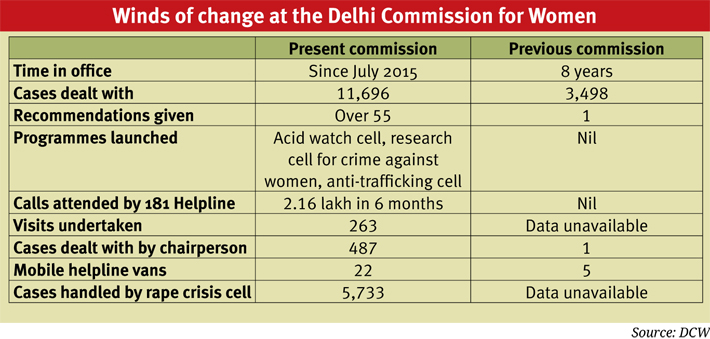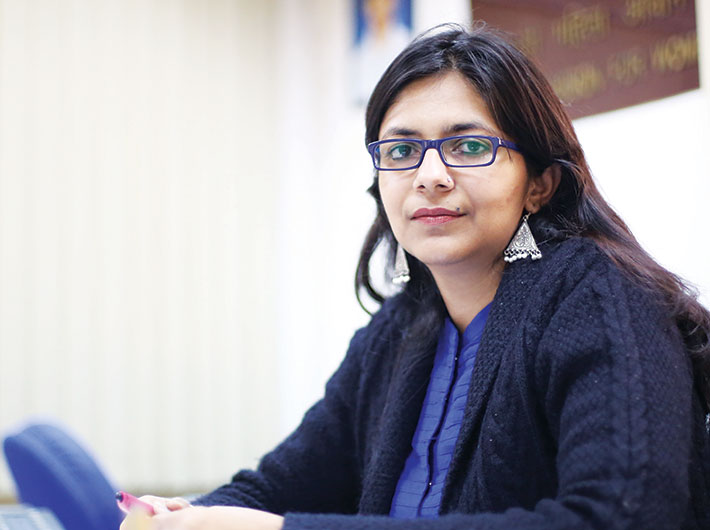Will DCW chief, Swati Maliwal be able to sustain the good work in the face of interfering rivals?
The pale yellow room on the second floor of Vikas Bhawan near Bahadur Shah Zafar Marg, ITO, is bustling with people, mostly women. Everyone is at work; some are calling for people waiting outside, others are talking to those seeking help. In spite of the chaos and frenzy, there is an unmistaken sombre mood in the room. The narrow corridor that doubles up as the waiting room resembles an OPD of a hospital; people are making a beeline for the empty chairs and waiting for their turn. Most of them look anxious.
“Shaswati and Abhinav Kumar,” a woman constable calls out in a stern voice. And the couple is quietly taken inside. They are now talking to the staff at the help desk of the Delhi Commission for Women (DCW).
“Their 16-year-old daughter has gone missing,” an official informs me.
“Mrinal [name changed] had gone out for tuition yesterday [February 1] and didn’t return. We tried calling her but her phone was switched off. So we filed an FIR. The police are hardly helping us. Hence, we approached the DCW,” Mrinal’s mother says, tears rolling down on her face. Her husband tries to put up a straight face.
After listening to the distraught parents’ story, the woman at the help desk calls out for “Mohini”. The focus shifts to a woman in a hot pink salwar-kameez seated close by, who had been listening to the couple’s story. She responds with a smile that blurs the scars on her face.
Mohini Attri, an acid attack survivor, is a graduate from Delhi University and now the key person at the commission’s help desk. “Most of the complainants give me a strange look first,” says the 33-year-old, who is studying the file of a 20-year-old woman deserted by her husband. “My own story gives them a sense of courage.”
Mohini fell prey to an acid-attack by a family friend 13 years ago. “One day he proposed marriage to me, but I turned him down. Later, when I was travelling with my father, he threw acid on my face and ran away. I felt that my entire face was melting. I went through almost 25 surgeries,” says Mohini, her voice quivering. She had lost all hope when she came to know about DCW’s offer of help to people like her in getting compensation. Little did she know that this would be the turning point of her life. Swati Maliwal, the new head of the DCW, had gone through her file. She was surprised to be asked to face a job interview. Mohini is now a star on the DCW’s help desk.
The new-look DCW leads by example, and Mohini is one.
Back to the story of the missing girl: After patiently counselling the distraught couple, Mohini and her colleague prepare a report. Within 30 minutes, their case is referred to a mobile helpline van. The couple are taken to three women counsellors. “Your case has been registered with a copy of the FIR. Now we will ask the police for the status report on the case; this will put pressure on them,” one of the counsellors tells the couple. “Don’t worry, we are working,” the other one says in a reassuring tone.
Mrinal’s parents are asked to return in a few days.
***
At one time these pale rooms looked like sleepy corners of officialdom; they are now best described as a bustling sarkari office. The woman who transformed this moribund organisation hardly looks like a powerful leader. Dressed in casual blue jeans and loose denim shirt and wearing rectangular reading glasses, the 32-year-old Swati Maliwal can pass off as the girl next door. Maliwal, who came into prominence through Anna Hazare’s anti-corruption movement, lost no time in galvanising DCW into action after taking charge in July 2015. In 19 months, the commission has handled about 12,000 cases. In contrast, her predecessor, Barkha Singh Shukla, had dealt with 3,498 cases in eight years!
“When I came here, the phones did not work, and there was no monitoring of programmes. The total staff strength was 26. Hundreds of women were approaching DCW every day. Cases were pending for six months with no action being taken. Therefore, we set up a help desk. Each case is now being dealt with within 72 hours,” says Maliwal.
The word spread and soon all roads for aggrieved women were leading to the DCW’s nondescript office. “The moment people started realising that work is getting done here, they started approaching us. We got the 181 [women] helpline transferred to us. Till now, over 3.16 lakh calls have been attended to on this line,” Maliwal says.
The commission’s four members (including Maliwal) have held hearings in 9,806 cases. In the first three months, Maliwal had personally heard 147 cases at the commission and made nine recommendations to the government, including on issues like inadequate supply of condoms. In comparison, her predecessor had personally heard one case and made no recommendation to policymakers. She would generally pay a visit to the commission once a week – preferably Friday, old staffers recall.
***

However, this turnaround was not an easy task for Maliwal. An engineering graduate, Maliwal had left a well-paying corporate job in 2006 to work for social causes. She was the youngest member of the core team of Anna Hazare’s anti-corruption movement in 2011 and later an advisor on public grievances to chief minister Arvind Kejriwal. These were good reasons for the opposition to fume at her appointment. Her appointment was caught in the now infamous tussle between Kejriwal and former lieutenant governor Najeeb Jung, delaying her assuming charge by two weeks.
Maliwal had to face attacks from all sides. Since she is married to an AAP leader from Haryana, Naveen Jaihind, opposition alleged that he had pulled the string to get her the job. “This reflects the patriarchal mindset of people. We talk about women’s empowerment but when a woman is chosen on merit, why do we only talk about her identity in relation to her husband, father or brother? I am married to him, but that is not my only identity. I have been working in the social sector and for women empowerment for 10 years,” says Maliwal, a bit agitated.
Maliwal continues to face obstacles as she goes the whole hog to make the commission a potent institution for women. Last year, the anti-corruption branch (ACB) of the Delhi government filed a case against her for “illegal appointments”. Not surprisingly, the complaint was lodged by her predecessor Barkha Shukla Singh, who is also a Congress leader. Shukla Singh alleged that 85 consultants and legal counsellors were appointed by Maliwal without adhering to the norms, such as advertising for the posts etc.
Shukla Singh alleged that this was done to give jobs to people like Prabhsahay Kaur, the daughter of HS Phoolka, and other kin of AAP leaders.
Maliwal has a different story on this: “The commission had a staff of 26 people. How could I work with such an acute shortage of manpower? I requested the government for staff; they did not provide me any. Following that, I had to make some short-term emergency appointments in the same procedure that was being followed for a long time. The member-secretary told me the procedure, and I followed it.”
But the damage was done. The newly appointed DCW member-secretary, bureaucrat Alka Diwan, stopped disbursement of salaries to the new staff, after an FIR was lodged. Being a bureaucrat, Diwan went by the rulebook and found that 85 persons were appointed through a process that did not have any precedent. The employees did not get paid for four months and the commission was mulling whether to shut down the 181 women helpline, the rape crisis cell and the mobile helpline when reprieve came from the Delhi high court. Three months back, the court ordered that 50 percent salary arrears of these staff be released.
The DCW was also caught in the tiff between Kejriwal and former Delhi LG Jung. “Most of the files are stuck with the LG. We have borne the brunt of the LG’s stubborn attitude; he has been holding the files, which created problems for us,” says Maliwal. It’s for this reasons that the commission was not able to fully utilise the enhanced budgetary allocation of Rs 7 crore (from Rs 3.75 crore) for the year 2016-17. The money was to be used for taking measures to make women in Delhi feel more secure.
***
The commission gets a large number of cases linked to women’s security. This is natural as, over the years, the national capital has earned a dubious reputation and names such as ‘rape capital’ and ‘stalking capital’. According to a study published in the International Crime Justice Review (March 2016), 57.6 percent of women interviewed in Delhi had experienced sexual harassment in one form or the other. Of this, 42 percent had encountered sexual harassment in public spaces. The annual report of the DCW for 2015-16 also states that every day, Delhi witnesses over six cases of rape.
It’s hardly surprising that almost every other day, the commission encounters women and girls who have faced rape and sexual assault, sexual harassment at the workplace or domestic violence. Then there are victims of trafficking. A counsellor told me that, recently, an NGO made a distress call to the DCW to seek help in halting the marriage of two girls, aged 13 and 14 years, in Noida. Both the girls’ parents were poor and were marrying their daughters for financial reasons. Immediately DCW member Promila Gupta contacted the Noida SSP. By the evening, the weddings had been halted.
It’s Monday, and Maliwal is back from a surprise visit to the Asha Kiran home for mentally challenged women in Rohini. She looks hassled as she found 11 inmates had died there in two months. “The premises had dirty toilets, nude inmates and mentally challenged persons were crawling on the floor. Shockingly, nude women were roaming in the corridors and the CCTV cameras installed there were being monitored by male staff,” she exclaims. Maliwal sent a notice to Delhi’s social welfare department, asking the secretary to reply within 72 hours.
Maliwal and her team have spent days and nights in shelters, and at homes for aged women. The commission has also introduced the concept of community participation in resolving marital discords and other social issues through mahila panchayats; their numbers have increased from 30 to 70. Under this scheme, an NGO in each assembly constituency will be linked to the commission, which will have three to four personnel working at the grassroots level on issues like domestic violence and police inaction. They will aim to work out solutions to the complaints forwarded by the DCW helpline to the mahila panchayats.
The DCW’s 22 mobile helpline vans have speeded up justice for women. They are used for carrying out rescue operations and helping those who call on the 181 helpline. The vans have undertaken 7,500 sorties to help women in distress.
***
Like all statutory commissions, the DCW only has the power to make recommendations. However, Maliwal feels she is empowered to do her job. “By representing the issue of women safety, we are already a powerful organisation. Talking about power, we have a lot of mandate in the act. For instance, we are a civil court. If there’s an issue, we can issue summons, we can also issue arrest warrants if the person is refusing to come,” she says, adding that “on the one hand, we need to fight for more power, and on the other, we must utilise the powers we already enjoy.”
***
It’s over a month now, and Mrinal’s parents are happy that their daughter, who was kidnapped, is back home. It seems the DCW counsellor had followed up the case with the police. “After a few days, the police realised that they cannot sit on this case. One day, they called us and said that the girl has been found from Seelampur [northeast Delhi] and has been rescued,” says the counsellor.
All praises for DCW, the victim’s doting mother said, “If DCW had not been there, we wouldn’t have been able to find our daughter.”
***
Interview: DCW chairperson, Swati Maliwal

How is DCW under your leadership different from your predecessor’s leadership?
The first thing is that we are very accessible and working round-the-clock. Secondly, we are reaching out to those women who don’t have a voice. For instance, voices of women working in GB road, nari niketan or beggar homes are subdued, so we are reaching out to them on our own. Our work is not restricted to the four walls of this office, we are always on the ground. These are certain things that have led to the change.
What has been your biggest achievement in the commission?
We had our first in a very long time. For the past one year we had been requesting the [former] LG [Najeeb Jung] to have a women safety committee, and then finally we had to go to the high court. The court for the first time in the history of the country issued a notice to the LG asking why he hadn’t held a single meeting on women safety. In response to the same notice, the new LG [Anil Baijal] has now formed the committee.When AAP was fighting elections; they made a host of promises regarding women safety. From having marshals in buses to CCTV cameras in dark spots, hardly anything seems to have been done on ground.
It’s a systemic problem in Delhi. I am requesting the centre to set up a high-level committee including the Delhi chief minister, union home minister, police commissioner, LG and the DCW. This is because a lot of files are passed from the Delhi government, but get stuck somewhere. For instance, the Delhi government asked for Nirbhaya fund to be put for CCTV cameras. The file was sent in July 2015 but the fund has not been released yet.
Its been almost two years in the DCW, where does Swati Maliwal see herself after DCW?
Let’s see. Somewhere in the activism, working on the ground.
ankitasharma@governancenow.com
(The story appears in the March 16-31, 2017 issue)

